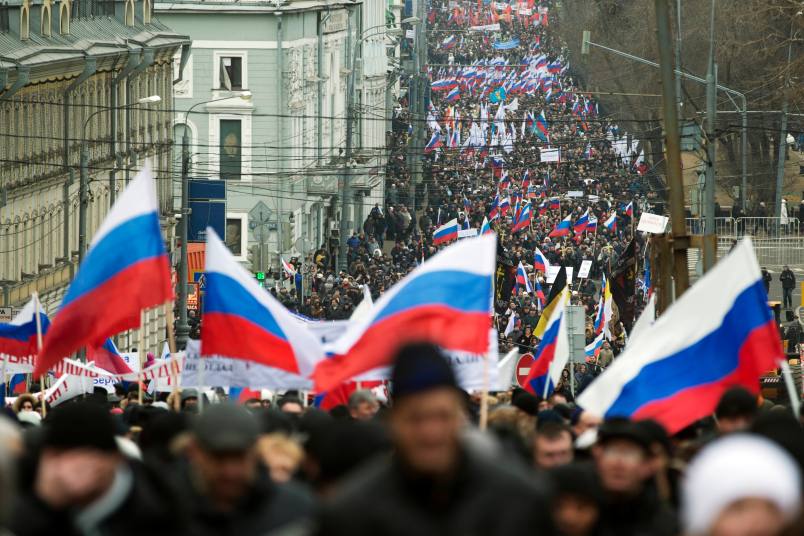MOSCOW (AP) — Thousands marched freely through Moscow on Sunday in support of Russia using military force in neighboring Ukraine, while at an anti-invasion protest nearby dozens were detained.
Russian state television ratcheted up its pro-invasion rhetoric over the weekend and showed what it claimed were buses full of refugees pouring across the Ukrainian border, fleeing what anchors call the “fascist thugs” who took power after Russia-leaning President Viktor Yanukovych fled the country last week after months of protest.
At least 10,000 people waving Russian flags rallied in central Moscow. Some dressed in Soviet military uniforms and shouted slogans like “Fascism will not pass!” and “No to Nazism!” — evoking parallels with the repulsion of Hitler’s troops from Ukraine in World War II.

But at an anti-invasion protest near Red Square, dozens of demonstrators — one of whom held up just a blank piece of poster paper in protest — were quickly detained by police. The Associated Press witnessed more than 50 detentions and spotted at least five police vans, which carry between 15 and 20 protesters, driving away from the square.
Since parliament gave President Vladimir Putin the green light to use military force in Ukraine late on Saturday, the Russian leader has defied calls from the West to pull back his troops, insisting that Russia has a right to protect its interests and those of Russian-speakers in the strategic Black Sea region of Crimea and elsewhere in Ukraine.
Russia’s state-controlled media has played almost nonstop footage of the Ukrainian crisis since the announcement, highlighting what it says are videos of attacks on pro-Russian activists by activists from Kiev or regions further west.
Russia Today claimed that 675,000 of Ukraine’s population of 46 million had fled across the border to Russia, and showed the governors of Russia’s western-most regions gearing up to accept the flood of refugees. State-owned channel Russia One showed what it alleged were cars lining up to flee the border into Russia — but the sign marking the border was actually for Shegini, a town on Ukraine’s western border with Poland.
While many Russians have long believed Moscow should maintain strong ties with Ukraine’s east and south, the media campaign has helped nudge public opinion toward favoring more dramatic action. A poll by independent Levada Center released on Feb. 26 showed that 43 percent of Russians considered the protests in Ukraine a “violent government coup,” while 45 percent believed the protests were sponsored by Western governments attempting to win “geopolitical influence” in the region.

“We are one brotherly nation, we are all Russians in our souls,” said Galina Kravchuk, a retiree at the pro-invasion rally who said she had lived in Crimea all her life but was visiting her daughter in Moscow. “Those protesters (in Ukraine) are hired. They are paid by the West and by America.”
But among many at the rally, active support seemed paper thin. Many were delivered to the square by buses marked as city government property, and others confessed that they had been forced by their employers to attend.
“The boss forced us to come,” said Elena, who wouldn’t give her last name for fear of repercussions at her workplace. “Do you really think that all these people came here voluntarily? Never.”
Copyright 2014 The Associated Press. All rights reserved. This material may not be published, broadcast, rewritten or redistributed.






